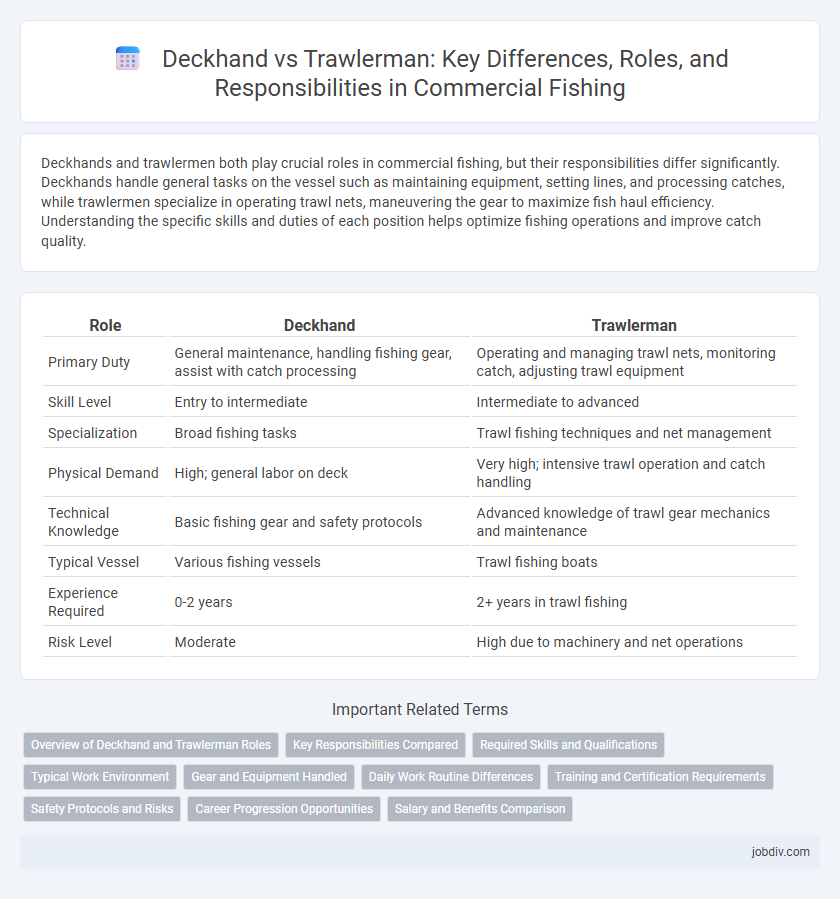Deckhands and trawlermen both play crucial roles in commercial fishing, but their responsibilities differ significantly. Deckhands handle general tasks on the vessel such as maintaining equipment, setting lines, and processing catches, while trawlermen specialize in operating trawl nets, maneuvering the gear to maximize fish haul efficiency. Understanding the specific skills and duties of each position helps optimize fishing operations and improve catch quality.
Table of Comparison
| Role | Deckhand | Trawlerman |
|---|---|---|
| Primary Duty | General maintenance, handling fishing gear, assist with catch processing | Operating and managing trawl nets, monitoring catch, adjusting trawl equipment |
| Skill Level | Entry to intermediate | Intermediate to advanced |
| Specialization | Broad fishing tasks | Trawl fishing techniques and net management |
| Physical Demand | High; general labor on deck | Very high; intensive trawl operation and catch handling |
| Technical Knowledge | Basic fishing gear and safety protocols | Advanced knowledge of trawl gear mechanics and maintenance |
| Typical Vessel | Various fishing vessels | Trawl fishing boats |
| Experience Required | 0-2 years | 2+ years in trawl fishing |
| Risk Level | Moderate | High due to machinery and net operations |
Overview of Deckhand and Trawlerman Roles
Deckhands perform essential tasks such as gear handling, net maintenance, and assisting with catch processing on fishing vessels, ensuring smooth daily operations. Trawlermen specialize in operating and managing trawl nets, controlling deployment and retrieval to maximize catch efficiency. Both roles require physical endurance and teamwork but differ in technical focus and responsibilities aboard commercial fishing boats.
Key Responsibilities Compared
Deckhands primarily handle line setting, baiting hooks, and maintaining fishing equipment, ensuring smooth daily operations on deck. Trawlermen focus on operating and monitoring trawl nets, managing winches and gear deployment, and sorting and handling catch during trawling activities. Both roles require physical endurance and teamwork but differ significantly in specialized fishing techniques and equipment management.
Required Skills and Qualifications
Deckhands must possess strong physical stamina, knowledge of knot tying, and basic safety training to handle deck operations efficiently. Trawlermen require advanced skills in operating trawl nets, understanding fish behavior, and using electronic navigation and fish-finding equipment for successful catch management. Both roles demand certification in maritime safety, but trawlermen often need specialized training in net handling and maintenance.
Typical Work Environment
Deckhands typically work on smaller fishing vessels such as longliners or pot boats, handling tasks like gear maintenance, baiting hooks, and sorting catch. Trawlermen operate on larger trawlers that deploy heavy nets to catch fish, often facing harsh conditions on the open sea and rougher weather. Both roles require physical endurance, but trawlermen usually experience longer hours and more exposure to mechanical equipment in colder, more demanding environments.
Gear and Equipment Handled
Deckhands primarily manage general fishing operations using gear such as hand lines, nets, and crab pots, while Trawlermen specialize in operating and maintaining trawl nets designed for dragging along the seabed or midwater to capture fish. Trawlermen handle winches, net drums, and hydraulic systems essential for deploying and retrieving heavy trawl gear, often requiring technical expertise in gear maintenance. Both roles demand proficiency in safety equipment and navigation tools, but Trawlermen focus more on mechanized trawl gear versus the more manual tasks of Deckhands.
Daily Work Routine Differences
Deckhands primarily handle vessel maintenance, gear preparation, and sorting catch on deck, ensuring smooth daily operations in various weather conditions. Trawlermen focus on operating and monitoring trawl nets, managing catch retrieval, and maintaining winch systems throughout the fishing process. The deckhand's routine emphasizes manual labor and equipment upkeep, while the trawlerman's work centers on technical net deployment and catch extraction tasks.
Training and Certification Requirements
Deckhands typically require basic safety training such as STCW Basic Safety Training and fishing-specific courses like sea survival and first aid, with no formal certification mandatory in most regions. Trawlermen often need more specialized training involving the operation and maintenance of trawl gear, alongside certifications in vessel safety and machinery handling to manage the complex equipment on trawlers. Both roles emphasize hands-on experience, but trawlermen undergo more intensive practical and technical instruction due to the specialized nature of their duties.
Safety Protocols and Risks
Deckhands and trawlermen face distinct safety protocols tailored to their specific roles on fishing vessels; deckhands primarily adhere to general ship safety measures such as wearing personal flotation devices (PFDs) and maintaining clear communication during line handling. Trawlermen encounter heightened risks from heavy machinery and winches, necessitating specialized training in deck machinery operation, emergency stop procedures, and the use of safety guards to prevent entanglement. Both roles emphasize hazard awareness and adherence to vessel safety management systems to mitigate risks associated with harsh marine environments and strenuous manual labor.
Career Progression Opportunities
Deckhands typically begin their fishing careers assisting with basic vessel operations and gradually acquire skills in navigation, gear handling, and safety procedures, creating pathways to roles like trawlerman or mate. Trawlermen possess specialized expertise in operating trawl nets and managing catch quality, often advancing to senior positions such as skipper or fishing vessel supervisor due to their technical knowledge and leadership on deck. Career progression from deckhand to trawlerman involves practical experience, certifications, and demonstrated proficiency in fishing techniques, enhancing opportunities for higher-ranking roles within commercial fishing fleets.
Salary and Benefits Comparison
Deckhands typically earn an average salary ranging from $25,000 to $40,000 annually, with benefits often limited to basic healthcare and on-vessel accommodations. Trawlermen, possessing specialized skills in operating and managing trawl nets, usually command higher salaries between $35,000 and $55,000 per year, alongside enhanced benefits such as hazard pay and extended shore leave. The salary gap reflects the increased technical expertise and responsibilities required of trawlermen in commercial fishing operations.
Deckhand vs Trawlerman Infographic

 jobdiv.com
jobdiv.com